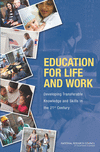Americans have long recognized that investments in public education contribute to the common good, enhancing national prosperity and supporting stable families, neighborhoods, and communities. Education is even more critical today, in the face of economic, environmental, and social challenges. Today’s children can meet future challenges if their schooling and informal learning activities prepare them for adult roles as citizens, employees, managers, parents, volunteers, and entrepreneurs. To achieve their full potential as adults, young people need to develop a range of skills and knowledge that facilitate mastery and application of English, mathematics, and other school subjects. At the same time, business and political leaders are increasingly asking schools to develop skills such as problem solving, critical thinking, communication, collaboration, and self-management – often referred to as “21st century skills.”
